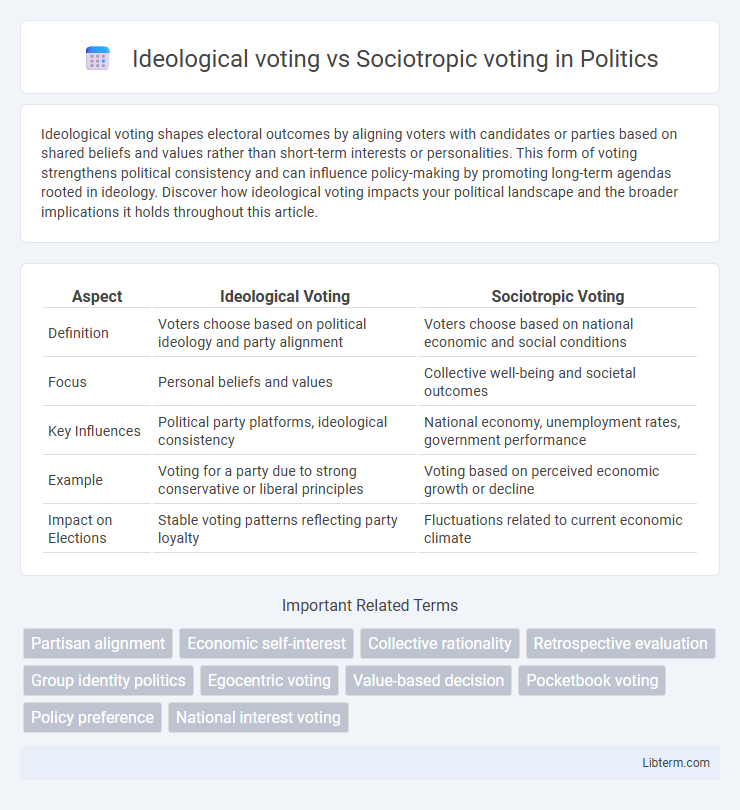Ideological voting shapes electoral outcomes by aligning voters with candidates or parties based on shared beliefs and values rather than short-term interests or personalities. This form of voting strengthens political consistency and can influence policy-making by promoting long-term agendas rooted in ideology. Discover how ideological voting impacts your political landscape and the broader implications it holds throughout this article.
Table of Comparison
| Aspect | Ideological Voting | Sociotropic Voting |
|---|---|---|
| Definition | Voters choose based on political ideology and party alignment | Voters choose based on national economic and social conditions |
| Focus | Personal beliefs and values | Collective well-being and societal outcomes |
| Key Influences | Political party platforms, ideological consistency | National economy, unemployment rates, government performance |
| Example | Voting for a party due to strong conservative or liberal principles | Voting based on perceived economic growth or decline |
| Impact on Elections | Stable voting patterns reflecting party loyalty | Fluctuations related to current economic climate |
Understanding Ideological Voting: Definition and Characteristics
Ideological voting refers to the practice where voters base their electoral choices on a consistent set of political beliefs or values that align with a particular ideology, such as liberalism or conservatism. Key characteristics include a strong attachment to political principles, issue-based decision-making, and long-term stability in voting patterns. Unlike sociotropic voting, which depends on perceptions of the overall economic or social conditions, ideological voting reflects deep-seated convictions influencing party loyalty and policy preferences.
What is Sociotropic Voting? Key Concepts Explained
Sociotropic voting refers to the practice where voters base their decisions on the overall economic conditions and social well-being of the country rather than their personal financial situation. This concept highlights the influence of collective outcomes, such as national unemployment rates and inflation, on individual voting behavior. Sociotropic voters prioritize policies and candidates that promise to improve the broader societal context over purely self-interested considerations.
Historical Contexts: When Ideological and Sociotropic Voting Matter
Ideological voting became prominent during the Cold War era, as voters aligned with clear political doctrines like capitalism or socialism, reflecting deeply entrenched beliefs about governance and society. Sociotropic voting gained significance in post-war democracies where economic conditions, such as inflation and unemployment rates, directly shaped public opinion and electoral outcomes, influencing support based on perceived national well-being. Historical crises like the Great Depression and the 2008 financial collapse exemplify periods when sociotropic concerns outweighed ideological loyalty, highlighting how economic contexts shift voter priorities.
Theoretical Foundations: Comparing Both Voting Behaviors
Ideological voting is grounded in the alignment of voters' policy preferences and core beliefs with political parties or candidates, emphasizing consistency in political values over time. Sociotropic voting theory suggests that voters prioritize the broader economic and social well-being of their community or nation when making electoral decisions, often influenced by perceptions of national rather than personal economic conditions. Both voting behaviors highlight different cognitive processes: ideological voting relies on stable political identity and issue-based evaluations, while sociotropic voting centers on collective welfare assessments and retrospective evaluations of societal trends.
Psychological Motivations Behind Ideological Voting
Ideological voting is driven by deep-seated psychological motivations including a strong identification with a political ideology that shapes perceptions of social reality and guides consistent policy preferences. Voters motivated by ideology often seek cognitive consistency, aligning their choices with belief systems that provide meaning and coherence to complex political issues. In contrast, sociotropic voting is influenced more by evaluations of the broader economy and social conditions affecting the community rather than strict adherence to ideological principles.
Economic Conditions and Their Impact on Sociotropic Voting
Economic conditions significantly influence sociotropic voting, where voters prioritize national economic well-being over personal financial situations when making electoral decisions. Rising unemployment rates, inflation, or economic recessions tend to shift public opinion, leading to decreased support for incumbents perceived as responsible for poor macroeconomic management. Research shows that sociotropic voters respond more strongly to changes in overall economic indicators, highlighting these factors as critical determinants in electoral outcomes compared to ideological alignment.
Case Studies: Examples of Ideological vs Sociotropic Voting in Elections
Case studies from the 2008 U.S. presidential election reveal a clear distinction between ideological and sociotropic voting, with voters favoring policies aligned with their personal beliefs versus broader economic conditions. In the 2017 French presidential election, sociotropic voting surged as voters prioritized national economic stability over ideological preferences, benefiting Emmanuel Macron. Comparative analyses of the 2016 Brexit referendum highlight ideological voting patterns in Leave supporters, contrasted with remain voters driven by sociotropic concerns about economic impacts.
Demographic Patterns: Who Votes Ideologically vs Sociotropically?
Demographic patterns reveal that younger, higher-educated voters are more likely to vote ideologically, prioritizing party orientation and policy alignment. In contrast, older voters and those with lower educational attainment tend to vote sociotropically, focusing on economic conditions and government performance. Income levels and political engagement also influence these tendencies, with wealthier and more politically active individuals favoring ideological voting.
Consequences for Political Parties and Policymaking
Ideological voting, characterized by alignment with consistent policy preferences and values, incentivizes political parties to develop clear, coherent platforms to mobilize dedicated voter bases, often resulting in polarized policymaking. Sociotropic voting, based on perceptions of the broader economy or social conditions, encourages parties to emphasize pragmatic and adaptive policies responding to current public concerns, potentially leading to more centrist and fluctuating policy agendas. The tension between these voting behaviors shapes parties' strategic positioning and policymaking, balancing ideological commitment with responsiveness to shifting social and economic evaluations.
Future Trends: Shifts in Voting Behavior in Modern Democracies
Emerging research indicates a gradual shift in modern democracies where sociotropic voting gains prominence over ideological voting, driven by increased awareness of economic and social policies' direct impact on voters' communities. This trend aligns with the rise of data analytics and targeted political campaigns emphasizing localized issues rather than broad ideological platforms. Future voting behavior may increasingly reflect pragmatic evaluations of government performance on societal well-being instead of fixed partisan identities.
Ideological voting Infographic

 libterm.com
libterm.com